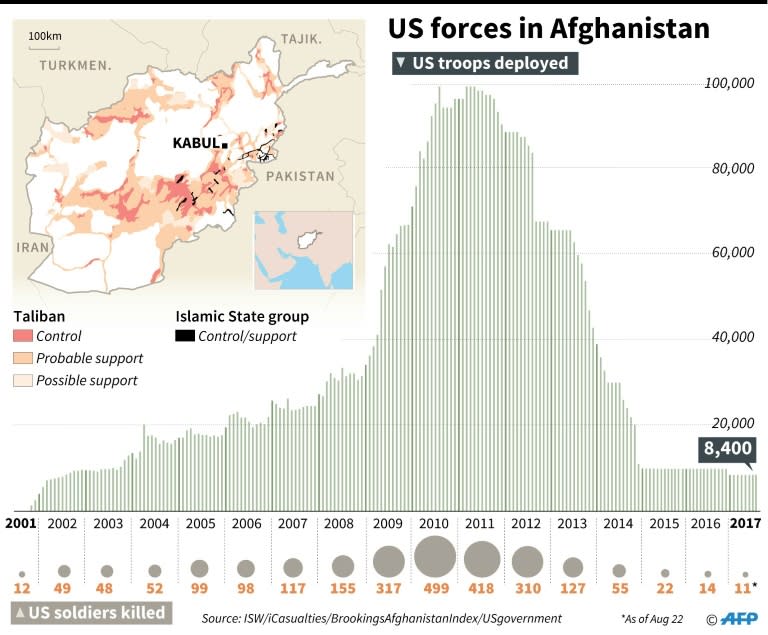Afghanistan welcomes Trump vow to stay 'without time limit'
Afghanistan Tuesday welcomed President Donald Trump's move to commit thousands more troops to America's longest war, reversing earlier pledges to pull out, but Taliban insurgents vowed to make the country a "graveyard" for US forces. President Ashraf Ghani, speaking to troops in southern Kandahar, birthplace of the Taliban, said Trump's first formal address as commander-in-chief late Monday showed that America was "with us, without any time limit". "You cannot win this war," Ghani told the Taliban, calling on them to join talks and saying his country wants peace with neighbouring Pakistan, long accused of fuelling the insurgency. Trump pilloried Pakistan in his speech for offering safe haven to "agents of chaos" -- words welcomed by Islamabad's arch-enemy India but rejected by its ally China. For its part, Pakistan released a carefully worded Foreign Office statement late Tuesday in which it called for peace in Afghanistan and pledged to work with the international community to "eliminate the menace of terrorism". The US president also discarded his previous criticism of the nearly 16-year-old war as a waste of time and money, admitting things looked different from "behind the desk in the Oval Office". "My instinct was to pull out," Trump said as he spoke of his frustration with a war that has killed thousands of US troops and cost US taxpayers hundreds of billions of dollars. But following months of deliberation, Trump said he had concluded a rapid exit would predictably create an unacceptable vacuum which terrorists "would instantly fill". He refused to offer detailed troop numbers, but senior White House officials said he had already authorised his defence secretary to deploy up to 3,900 more troops to Afghanistan. Trump warned that security assistance to Afghanistan was "not a blank cheque", adding: "We are not nation-building again. We are killing terrorists." In response, the Taliban vowed to make the country "a graveyard" for the US and said it would continue its "jihad" as long as American troops remained in the country. - Pakistan's 'double game' - The US has grown increasingly weary of the conflict that began in October 2001 as a hunt for the 9/11 attackers and has turned into a vexed effort to keep Afghanistan's divided and corruption-plagued democracy alive amid a brutal Taliban insurgency. The fatigue extends to its dealings with Pakistan, criticised by successive US administrations for links with the Taliban and for harbouring leading jihadists -- like Osama bin Laden. "We have been paying Pakistan billions and billions of dollars at the same time they are housing the very terrorists that we are fighting," Trump said, warning that vital aid could be cut. "That will have to change and that will change immediately." "We want peace from Pakistan, they cannot provide safe havens to anyone anymore," Ghani said in Kandahar, as Afghan civilians who spoke to AFP praised Trump for illuminating the "double game" which they said Islamabad was playing in their country. The Indian foreign ministry said it welcomed Trump's effort to confront Pakistan. India has vied with Pakistan for influence in Afghanistan, and Islamabad's policies in the country are driven by its desire to keep New Delhi at bay. But China, which is investing around $50 billion in Pakistan, said its South Asian neighbour deserves the international community's support after the "great sacrifices" it has made in fighting extremism. - About face - Trump for the first time also left the door open to an eventual political deal with the Taliban. "Someday, after an effective military effort, perhaps it will be possible to have a political settlement that includes elements of the Taliban in Afghanistan," he said. "But nobody knows if or when that will ever happen," he added. The Trump administration had originally promised a new Afghan plan by mid-July, but the president was said to be dissatisfied by initial proposals to deploy a few thousand more troops. His new policy will raise questions about what, if anything, can be achieved by making further deployments, or repeating the demands of previous administrations in more forceful terms. In 2010 the United States had upwards of 100,000 US military personnel deployed to Afghanistan. Today that figure is around 8,400 US troops and the situation is as deadly as ever. Trump's announcement comes amid a month of turmoil for his administration, which has seen several top White House officials fired and revelations that members of Trump's campaign are being investigated by a federal grand jury. He sought in his address to convince Americans weary of his controversial off-the-cuff remarks of his seriousness. "I studied Afghanistan in great detail and from every conceivable angle," he said -- though his effort was undermined when he later referred to Afghanistan's non-existent "Prime Minister". burs-st/ds/sm




